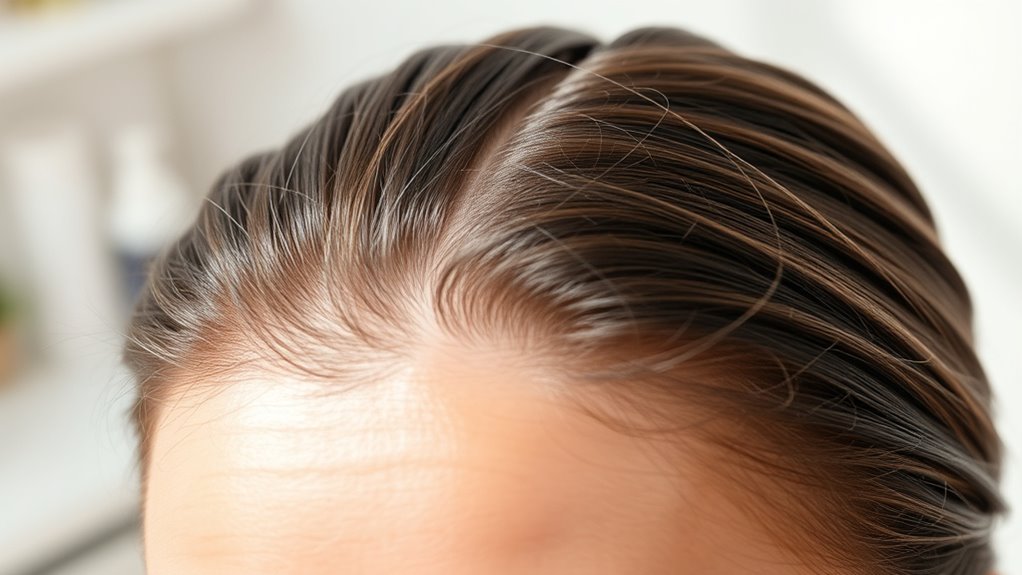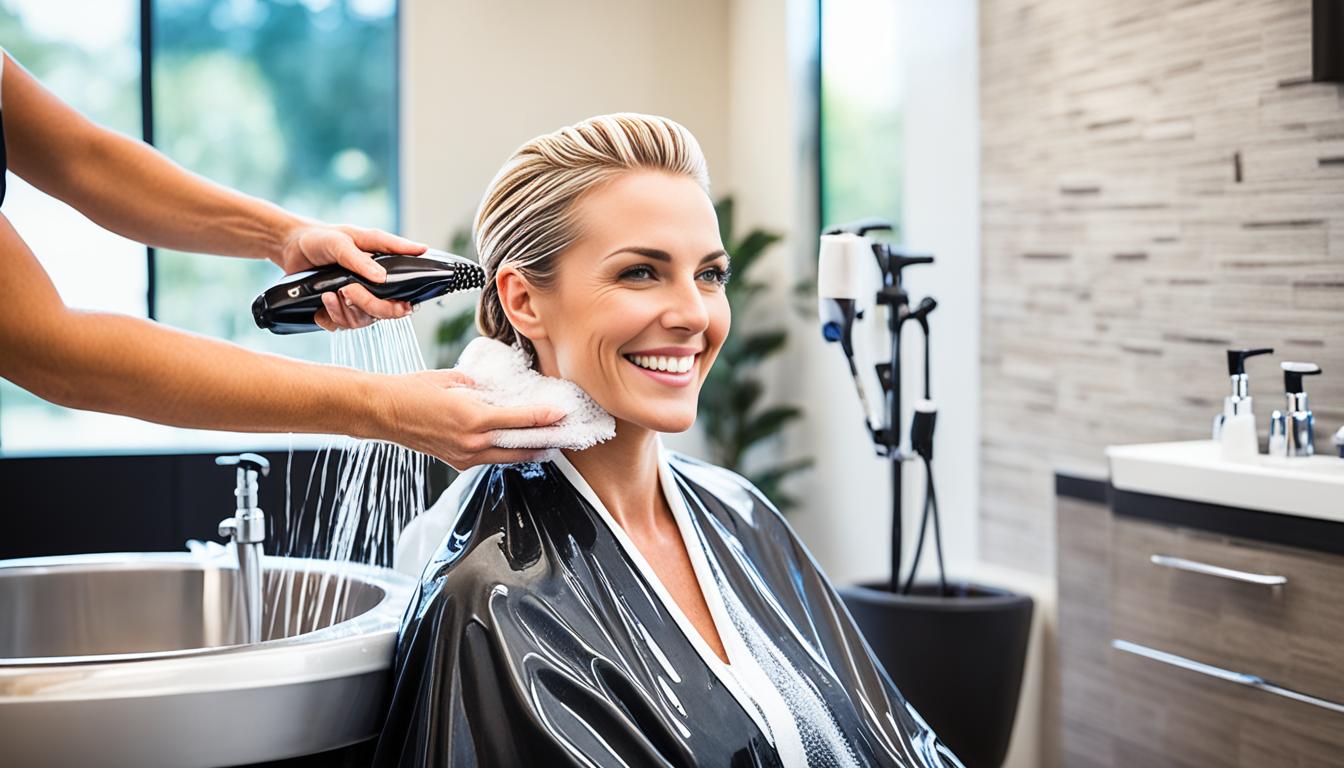Stop over-washing your scalp, using harsh shampoos, and neglecting conditioner—these habits strip natural oils and cause dryness. Instead, wash with lukewarm water, use gentle, sulfate-free products, and follow with conditioner or nourishing treatments. Incorporate scalp massages to boost circulation and stimulate oil production, and avoid hot water that damages your scalp. Continuing these smarter tips will help you maintain a healthier, balanced scalp and beautiful hair.
Key Takeaways
- Stop overwashing your scalp; wash less frequently with lukewarm water to maintain natural oils and prevent dryness.
- Avoid using harsh, sulfate-heavy products; switch to gentle, sulfate-free cleansers with natural ingredients.
- Do not neglect scalp massage; incorporate regular gentle massage to improve blood flow and promote healthy hair growth.
- Skip hot water for washing; opt for lukewarm or cool water to preserve scalp moisture and prevent irritation.
- Don’t ignore signs of scalp issues; address symptoms early with proper care and seek professional advice if needed.
Over-Washing Your Scalp

While it might seem helpful to wash your scalp frequently to keep it clean, over-washing can actually do more harm than good. When you wash your scalp too often, you strip away natural oils that are essential for scalp health. These natural oils help maintain scalp hydration, preventing dryness and irritation. Without enough oil, your scalp can become dry, flaky, and more prone to itchiness. Over-washing also disrupts the scalp’s natural balance, which can lead to increased oil production as your scalp tries to compensate. Instead of washing excessively, aim for a balanced routine that preserves your scalp’s natural oils. Proper hydration and gentle cleansing will keep your scalp healthy without stripping away the oils that protect and nourish it. Additionally, understanding the importance of a healthy scalp microbiome can help you make better choices for scalp care.
Using Harsh or Sulfate-Heavy Products
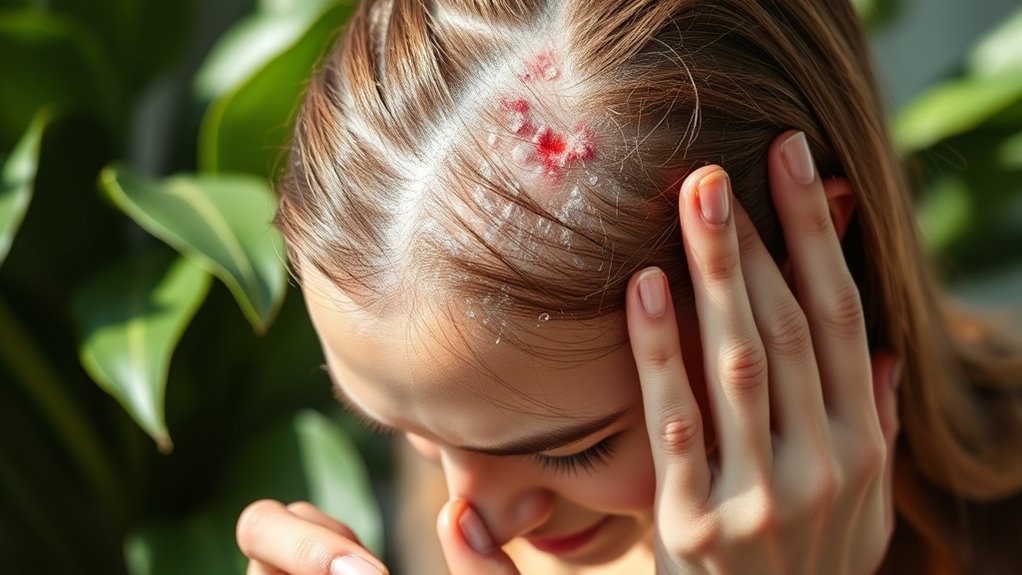
Using harsh or sulfate-heavy products can undermine your efforts to maintain a healthy scalp, especially if you’ve already been cautious about over-washing. Sulfates strip away natural oils, leaving your scalp dry and irritated, which can trigger excess oil production and dandruff. Instead, opt for gentle cleansers that clean effectively without harsh chemicals. Look for sulfate-free options formulated to be mild yet effective, helping preserve your scalp’s natural moisture barrier. These products reduce the risk of irritation and support a balanced scalp environment. Avoid the temptation of strong, foaming shampoos that can strip your scalp of essential oils. By choosing gentler, sulfate-free cleansers, you’ll promote healthier hair and scalp, making your scalp care routine more effective and sustainable in the long run. Additionally, choosing products with natural ingredients can further enhance scalp health and reduce irritation.
Skipping Conditioner or Moisturizing Treatments
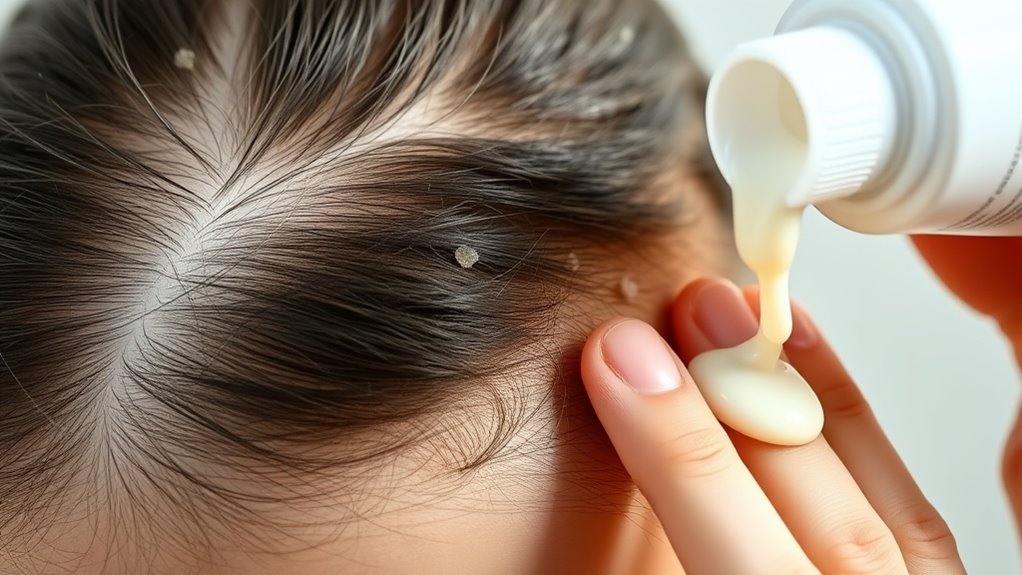
Skipping conditioner or moisturizing treatments can leave your scalp and hair vulnerable to dryness and damage. Without proper moisturizing routines, your strands lose essential moisture, making them brittle and prone to breakage. Conditioner benefits go beyond smoothing your hair; they help seal in hydration, protect against environmental stressors, and improve manageability. When you skip these steps, your scalp may become flaky or irritated, and your hair can look dull and lifeless. Regular conditioning restores moisture balance, strengthens strands, and maintains scalp health. Additionally, incorporating innovative materials into your hair care routine can further enhance the effectiveness of moisturizing treatments. Don’t overlook the importance of nourishing your scalp and hair with the right moisturizing treatments. Incorporating conditioner into your routine ensures your hair remains soft, shiny, and resilient, preventing long-term damage caused by neglecting hydration.
Ignoring Scalp Massage and Stimulation
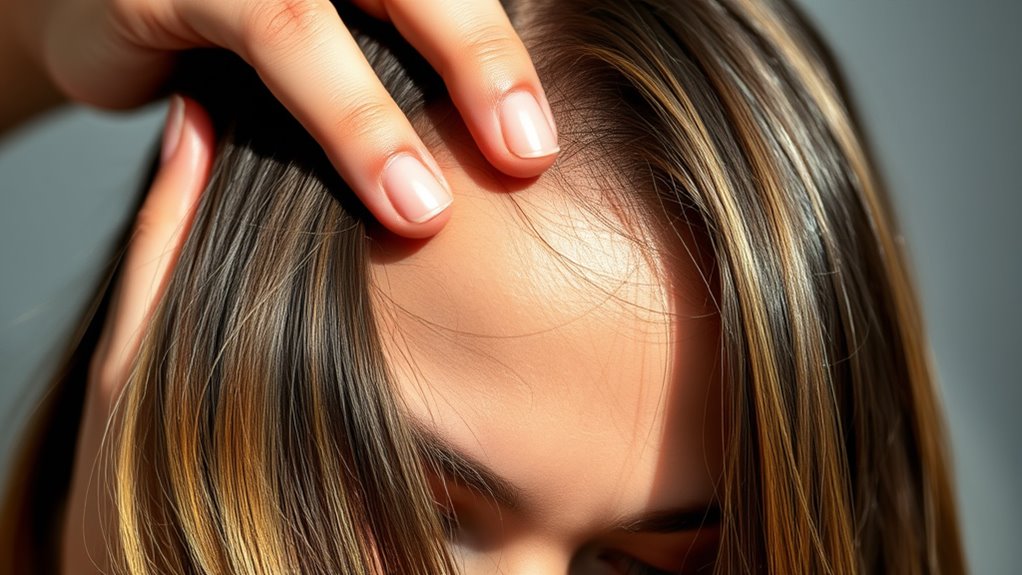
Ignoring scalp massage can slow down hair growth and miss out on essential stimulation. Learning simple techniques to activate your scalp daily can boost circulation and strengthen your roots. Don’t overlook this easy step—incorporate massage into your routine for healthier, fuller hair.
Benefits of Scalp Massage
A good scalp care routine offers numerous benefits that can enhance the health and appearance of your hair. One key benefit of scalp massage is improving scalp health by increasing blood flow, which delivers essential nutrients to hair follicles. This stimulation can also help loosen dead skin cells and reduce buildup, promoting a cleaner scalp environment. Additionally, massage benefits include easing tension and stress, which may contribute to healthier hair growth. Regularly massaging your scalp can encourage natural oil distribution, keeping your hair moisturized and shiny. Overall, incorporating scalp massage into your routine supports stronger, healthier hair by fostering a balanced scalp ecosystem. This simple step can make a noticeable difference in the vitality and look of your hair over time.
Techniques for Stimulating Growth
To effectively stimulate hair growth without relying on scalp massage and stimulation, focus on maintaining a healthy scalp environment through proper hair care practices. Regular scalp exfoliation removes dead skin buildup and unclogs hair follicles, promoting healthier growth. Use gentle exfoliating treatments or brushes designed for the scalp to achieve this. Incorporate essential oils like rosemary, peppermint, or tea tree oil into your routine, as they can improve circulation and nourish the scalp. Dilute essential oils properly and apply them directly to your scalp to enhance follicle health. Combining exfoliation with stimulating essential oils helps create an ideal environment for hair growth. Additionally, hydrotherapy techniques like warm water rinses can improve scalp circulation and promote healthier hair. Remember, consistent care and natural remedies are key to encouraging thicker, healthier hair over time.
Incorporating Massage Daily
Incorporating massage into your daily hair care routine can boost circulation and support healthier hair growth. Regular scalp massage benefits include increased blood flow, which delivers essential nutrients to hair follicles, promoting stronger growth. To maximize these benefits, use simple daily massage techniques like gentle circular motions with your fingertips, applying light pressure across your scalp. Spend about 5 minutes each day focusing on different areas, such as the crown and hairline. Consistency is key—making this a daily habit enhances scalp health and stimulates hair follicles. Avoid aggressive rubbing, which can cause irritation. Instead, keep your movements gentle yet firm. Incorporating angel number insights can also inspire positive energy and motivation during your scalp care routine. By integrating these daily massage techniques, you’ll improve scalp health and encourage more vibrant, resilient hair over time.
Neglecting Proper Shampooing Technique

Neglecting proper shampooing technique can leave your scalp greasy, itchy, and prone to buildup. If you don’t focus on effective scalp cleaning, dirt and excess oil can accumulate, clogging hair follicles and causing discomfort. Many people overlook the importance of shampoo frequency, either washing too often or not enough, which disrupts the scalp’s natural balance. Proper shampooing involves thoroughly massaging the scalp to remove impurities without stripping away essential oils. Using too little shampoo or applying it poorly can leave residue behind, leading to dullness and irritation. On the other hand, over-shampooing can strip moisture, causing dryness. Finding the right technique guarantees your scalp stays clean, healthy, and balanced, preventing issues linked to neglecting proper shampooing. Additionally, understanding how natural scalp balance is maintained can help tailor your hair care routine more effectively.
Using Hot Water for Cleansing
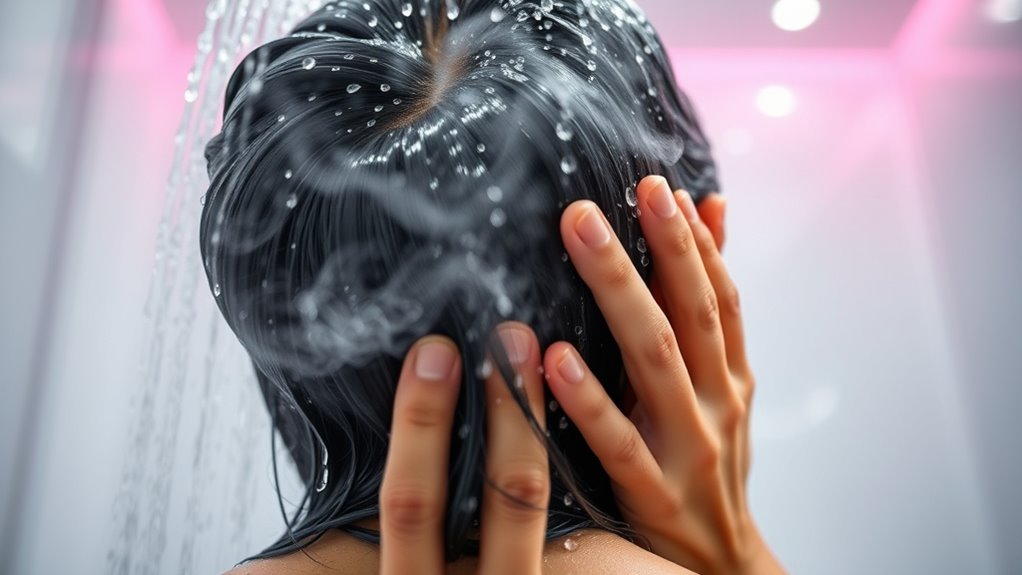
Using hot water to cleanse your scalp might seem effective, but it can actually damage your hair and skin. It strips away natural oils, leaving your scalp dry and irritated. Switching to lukewarm water helps protect your scalp’s health while still cleansing effectively. Additionally, using appropriate water temperatures can support the overall health of your hair in line with on-device AI capabilities, ensuring a balanced approach to scalp care.
Damages Hair and Skin
Hot water can do more harm than you might realize, especially when it comes to your hair and skin. Using hot water for cleansing strips away natural oils, leaving your scalp dry and prone to irritation. This can lead to hair breakage, making your strands weaker and more prone to damage. Additionally, overly hot water disrupts the scalp’s balance, impairing dandruff prevention efforts. Instead of hot water, opt for lukewarm or cool water to gently cleanse your scalp and hair. This helps preserve natural oils, reduces dryness, and keeps your scalp healthy. By avoiding hot water, you support stronger hair, fewer breakages, and a healthier scalp overall. Making this simple switch can considerably improve your scalp care routine and the health of your hair. Incorporating proper scalp health techniques can further enhance these benefits and promote long-term results.
Strips Natural Oils
When you wash your hair with hot water, it can remove more than just dirt; it strips away your scalp’s natural oils. This disrupts your natural oil balance, leading to dryness and dullness. Over time, your scalp loses essential moisture, reducing scalp hydration and making your hair more prone to breakage. To protect your scalp, use lukewarm water instead, preserving those crucial oils. Here’s how hot water affects your scalp:
| Effect | Result |
|---|---|
| Strips natural oils | Causes dryness and irritation |
| Reduces scalp hydration | Leads to flaky scalp |
| Disrupts oil balance | Affects overall scalp health |
| Causes overproduction of oil | Creates greasy roots |
| Damages hair strands | Weakens hair structure |
Additionally, studies show that temperature regulation is essential for optimal angles in pinball machines, which can be likened to maintaining the correct balance in your scalp health for better overall results. Avoid hot water to maintain a healthy, balanced scalp and vibrant hair.
Causes Scalp Irritation
Ever wonder why your scalp feels itchy or irritated after washing? Using hot water can cause a scalp pH imbalance, stripping away natural oils and disrupting the skin’s protective barrier. This imbalance can make your scalp more vulnerable to bacterial infections, which often lead to redness, itchiness, and discomfort. Hot water opens up pores excessively, allowing bacteria to penetrate deeper and aggravate irritation. Instead of risking this, opt for lukewarm water that gently cleanses without disturbing your scalp’s natural balance. Maintaining proper pH levels helps keep bacteria at bay and supports a healthy scalp environment. Avoiding hot water prevents unnecessary irritation and promotes overall scalp health, making your routine more effective and comfortable.
Overusing Styling Products and Treatments

Overusing styling products and treatments can do more harm than good to your scalp. Excessive application leads to product buildup, which clogs hair follicles and increases scalp sensitivity. This buildup can trap dirt and oil, causing irritation and making your scalp more prone to inflammation. You might notice itchiness, redness, or even dandruff. To prevent this, use styling products sparingly and choose those suited for sensitive scalps. Regularly clarifying your scalp helps remove stubborn residue. Remember, more isn’t always better—moderation keeps your scalp healthy and balanced. Here’s a quick look:
| Warning Signs | Causes |
|---|---|
| Itchiness, redness | Product buildup, overuse |
| Increased scalp sensitivity | Harsh chemicals in treatments |
| Dandruff or flakes | Residue accumulation |
| Tight, greasy feeling | Excessive styling product use |
| Hair thinning or loss | Blocked follicles from buildup |
Additionally, choosing gentle, natural oils for scalp care can help soothe irritation and promote a healthier scalp environment.
Ignoring Signs of Scalp Issues

Ignoring signs of scalp issues can lead to worsening conditions and more complicated treatments down the line. When you overlook symptoms like itching, redness, or flakiness, you’re risking damage to your scalp health and making issue prevention harder. Early warning signs often signal underlying problems like dandruff, dermatitis, or scalp infections. Addressing these issues promptly helps maintain a healthy scalp and prevents long-term damage. Don’t dismiss persistent discomfort or unusual changes—these are your body’s way of alerting you. By paying attention to your scalp’s signals, you can catch problems early and seek appropriate treatment. Proper scalp care also involves understanding how color accuracy impacts visual health, as poor imaging can sometimes be associated with underlying skin or scalp conditions. Prioritizing scalp health through proactive care guarantees you avoid more severe issues later, keeping your scalp balanced and your hair looking its best.
Frequently Asked Questions
How Often Should I Actually Wash My Scalp for Optimal Health?
You should wash your scalp about two to three times a week to maintain ideal health. This frequency helps regulate scalp oil production and keeps your scalp’s pH balance in check. Over-washing can strip natural oils, leading to dryness or increased oil production, while under-washing allows buildup. Adjust based on your scalp type and activity level, but sticking to this routine supports a healthy, balanced scalp.
What Are Natural Alternatives to Harsh Shampoos for Sensitive Scalps?
For sensitive scalps, switch to natural alternatives like herbal remedies and gentle cleansers. Herbal remedies such as aloe vera, chamomile, or tea tree oil soothe your scalp without irritation. Use gentle cleansers free from sulfates and parabens, which strip natural oils. These options keep your scalp clean, balanced, and healthy, reducing irritation and inflammation. Incorporate these natural choices into your routine for a safer, more nourishing scalp care experience.
Can Scalp Massages Help With Hair Loss or Thinning?
Scalp massages can work wonders for hair loss and thinning, literally turning your scalp into a fountain of youth! By stimulating blood flow, they enhance scalp health and promote hair growth. The benefits of scalp massage are incredible—imagine waking up to thicker, fuller hair every day. Regularly massaging your scalp encourages hair growth stimulation and improves overall scalp condition, making it a simple yet powerful step in your hair care routine.
How Do I Know if My Scalp Needs Medical Treatment?
You should see a doctor if you notice persistent scalp infection, hair breakage, or redness and swelling that don’t improve with normal care. These signs indicate your scalp may need medical treatment. Ignoring symptoms can lead to further hair loss or damage. Pay attention to your scalp’s condition, and seek professional advice promptly to prevent worsening issues and guarantee proper treatment.
Are There Specific Ingredients I Should Avoid in Scalp Care Products?
Avoid products with harmful chemicals like sulfates, parabens, and synthetic fragrances, as they can irritate your scalp or cause ingredient allergies. Stay vigilant and read labels carefully, steering clear of ingredients that might trigger sensitivities. Instead, opt for gentle, natural options that nourish your scalp without risking irritation. Your scalp deserves care free from harsh chemicals, ensuring healthier hair and a more comfortable, balanced scalp environment.
Conclusion
Instead of harsh routines that strip away your scalp’s vitality, nurture it like a delicate garden—you’re the gardener tending to each leaf and root. Embrace gentle care, massage for growth, and listen to what your scalp whispers. When you treat it with kindness, your hair will bloom with strength and shine. Remember, a healthy scalp is the fertile ground where your confidence and beauty can flourish—cultivate it wisely.
